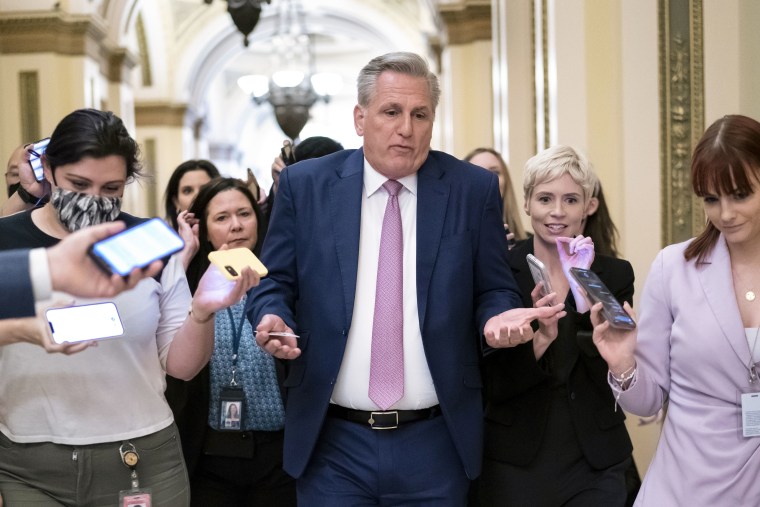In April, a variety of Republicans were grumbling about House Minority Leader Kevin McCarthy having boycotted the Jan. 6 committee. A senior House GOP aide told NBC News, for example, “I would say it’s absolutely a strategic mistake.”
That talk grew louder in the weeks and months that followed. The New York Times’ Maggie Haberman noted last month that some Republicans were privately “angry” with McCarthy, and as regular readers may recall, Donald Trump went considerably further soon after.
“Unfortunately, a bad decision was made,” the former president said. Though he didn’t call out McCarthy by name, Trump added that it “was a bad decision not to have representation on that committee. That was a very, very foolish decision.”
Exactly one month later, even Sean Hannity was pressing the House GOP leader on the matter. Mediaite noted overnight:
Amid former President Donald Trump’s growing consternation about having no supporters on the Jan. 6 Committee, Fox News host Sean Hannity is now questioning the man responsible for having most Republicans sit it out. On Wednesday night’s edition of Hannity, the Fox host quizzed House Minority Leader Kevin McCarthy (R-CA) about his decision to pull Republicans from the Jan. 6 committee — after two of McCarthy’s picks for the committee, Rep. Jim Jordan (R-OH) and Rep. Jim Banks (R-IN) were rejected by House Speaker Nancy Pelosi (D-CA).
“There have been questions asked, once they pulled Jim Jordan and Jim Banks, why didn’t you replace them with other people?” the host asked. “In retrospect, should you have?”
McCarthy responded, “No, not at all — because nothing would be different." The minority leader added that without the Republican boycott, “the American people would sit up there, and they would think this is a fair process.”
The California congressman has had plenty of time to come up with a defense for his strategy. His comments to Hannity suggest he hasn’t come up with much.
Right off the bat, the idea that this process isn’t “fair” is an increasingly tough sell: The House select committee has members from both parties; it has a Republican vice-chair; and most of the witnesses who’ve delivered public testimony have been Republicans.
But more important was McCarthy’s insistence that if he’d kept far-right members on the Jan. 6 committee “nothing would be different.” It’s important to understand the extent to which that’s backwards.
Let’s revisit our earlier coverage and take a stroll down memory lane.
In April and May of last year, the House GOP leader dispatched a trusted ally, New York Rep. John Katko, to negotiate the terms of an independent commission to examine the Jan. 6 attack. As regular readers may recall, McCarthy made sure to include unreasonable demands he expected Democrats to reject.
When Democrats agreed to Republicans’ terms anyway, McCarthy refused to take “yes” for an answer and rejected the compromise he’d asked for.
At that point, lawmakers moved on to Plan B: They’d create a bipartisan, special select committee to uncover the facts that McCarthy said he was eager to learn. As part of the process, GOP leaders were invited to recommend a slate of House Republicans to participate in the investigation, but House Speaker Nancy Pelosi had the final call on whether or not they qualified.
McCarthy picked five members, two of whom were rejected for being anti-election radicals, though Pelosi was willing to accept the other three Republicans chosen for the panel. Outraged, McCarthy quickly announced a boycott of the committee.
Pelosi offered him an opportunity to have three conservative Republicans participate in this investigation. He instead chose to have zero.
As chess moves go, this didn’t exactly position the GOP for success: McCarthy’s decision has left the Republican conference completely in the dark. Ahead of the hearings, the GOP didn’t know what the committee had, couldn’t prepare competent defenses for Trump, couldn’t influence the direction of the investigation, couldn’t ask contrary questions during public or private proceedings, couldn’t leak anything, and couldn’t dilute the panel’s findings in advance of a final report that’s expected in September.
“Nothing would be different”? Everything would be different.
McCarthy seemed to believe he was punishing House Democrats when he refused to participate in the process he previously supported. If he’d only thought ahead a bit more, the would-be House Speaker would’ve realized he was doing far more harm to his own interests.
The House Jan. 6 committee will hold its eighth public hearing on Thursday at 8 p.m. ET. Get expert analysis in real-time on our live blog at msnbc.com/jan6hearings.

